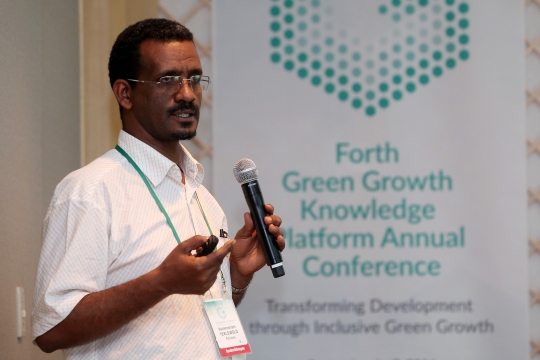Dr Hailemariam Teklewold of ECRC, the Ethiopian EfD- center, presented the paper ”Does multiple climate smart practices improve farmers' climate resilience” at the Fourth GGKP Annual Conference during the session on "Exploring the Climate change and the poverty nexus".
BRIEFLY DESCRIBE THE TOPIC AND CONCLUSION OF YOUR PAPER
The paper analyzes how heat, rainfall and rainfall variability affect smallholder farmers choice of portfolio of potential climate smart practices and the effect of these practices on farmers' income. In this study we find that farmers are less likely to adopt a risk increasing input (such as modern seeds and fertilizer) under high rain fall variability condition. But if farmers use agricultural water management practices the probability to use these yield enhancing inputs are increased even at high rainfall variability condition. We also find that smallholder farm income responds positively to the adoption of these climate smart practices but the effect is higher when these practices are adopted in combination than in isolation.
THROUGH YOUR RESEARCH, WHAT DO YOU FIND AS THE ROLE FOR INCLUSIVENESS IN THE TRANSITION TO A GREEN ECONOMY?
This study mainly focuses on maximizing income of the smallholder farmers who represent 85% of Ethiopia´s population and who are seriously affected by climate change. In addition to that, the study suggests judicious use of inputs which has implications on the greening of smallholder agriculture through Green House Gas emission reductions.
WHAT ARE THE KEY POLICY IMPLICATIONS OF YOUR RESEARCH?
There is a need to think about a new approach of promoting a package of climate smart practices rather than the present more fragmented approach.
WHAT ARE THE NEXT STEPS FOR YOUR RESEARCH?
The next steps will be to establish empirical evidence on the synergies/tradeoffs of portfolio of climate smart practices in terms of adaptation, resilience and mitigation effects.
